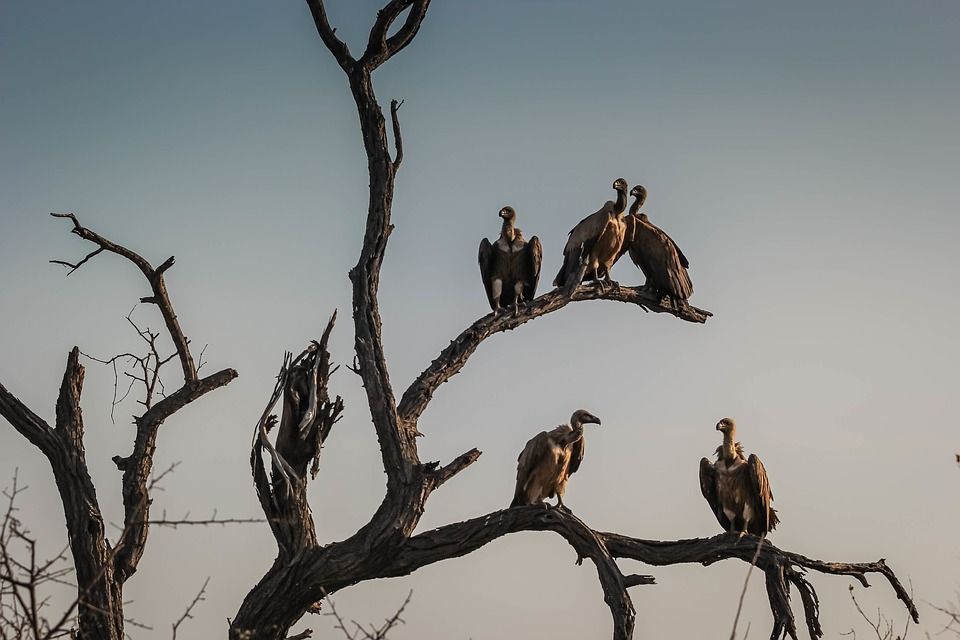
A project to prevent the death of vultures from poisoning in the KASA (KAvango and Zambezi) transboundary nature reserve has started in Botswana, the Weekend Post reported on February 3.
Birdlife Botswana, a bird protection society collaborating with three other partners (BirdWatch Zambia, BirdLife International and Birdlife Zimbabwe), is involved in rescuing vultures that have died en masse in the reserve.
Since vultures kill themselves by pecking at the carcasses of poisoned animals, these organizations have jointly started the fight against the poisoning of wild animals, which, in turn, negatively affects the vulture population.
Birdlife Botswana director Motsheregani Virat Koutshosice told the publication that the project is funded by the European Union. He noted that the Chobe area of Botswana was selected as a pilot area because vulture poisonings have increased in the area in recent months.
In August this year, it was reported that at least 50 white-backed vultures, whose population in Botswana was already endangered, had been killed in the Chobe National Park.
The vultures died after eating a buffalo carcass stuffed with poison. In November this year, 43 Steller’s vultures were found dead after pecking at the carcass of a zebra that also appeared to be poisoned.
At the same time, the fight to prevent wildlife poisoning has been taking place in Kafue, Zambia’s largest national park and Zimbabwe’s largest Hwange nature reserve.
Koutshosice explained that they had established a national and regional committee on wildlife poisoning in Botswana. In turn, the Botswana National Committee engaged the Departments of Crop Production, Agrochemistry, Veterinary Medicine, Wildlife and National Parks (DWNP), as well as various non-governmental organizations, to address the problem of wildlife poisoning.
He regretted that there is a gap in the availability of data on the poisoning of vultures and other wildlife in general. “If we have a central point to collect data, it will help in terms of awareness and promotion”he said.
The director of Birdlife Botswana added that the regional committee includes law enforcement officials such as the BDF (Botswana Self Defense Force) and police, village leaders including the village development committee, and traditional chiefs.
“We need to join forces and protect the wildlife we have, as this will increase our credibility in the field of nature conservation, and this alone will increase the number of visits to the reserves and boost our local economy.”He noticed.
Birdlife, together with DWNP, also recently held a series of meetings in some villages in the Chobe region. “Realizing that vulture poisonings in the Chobe areas are becoming more frequent, we understand that we need to do something about it. We have done public outreach by speaking at various community meetings in some villages in western Chobe.”Kutchose said.
He added that they had identified some of the common causes of wildlife poisoning, one of which is farmers poisoning predators such as lions in retaliation for killing their livestock.
Another reason is cross-border poaching in the Chobe region. When poachers, who are only interested in the tusks, kill an elephant, they poison its carcass to kill the vultures that circle the dead elephant and thus alert the authorities to the poachers’ activities.
But most of all, the defenders of the birds were concerned by the fact that they found the absence of some body parts of the found dead vultures. Kutsosice noted that in some African countries, vulture body parts are used in rituals and this leads to a reduction in the population of these birds.
Source: Rossa Primavera
I am Michael Melvin, an experienced news writer with a passion for uncovering stories and bringing them to the public. I have been working in the news industry for over five years now, and my work has been published on multiple websites. As an author at 24 News Reporters, I cover world section of current events stories that are both informative and captivating to read.
